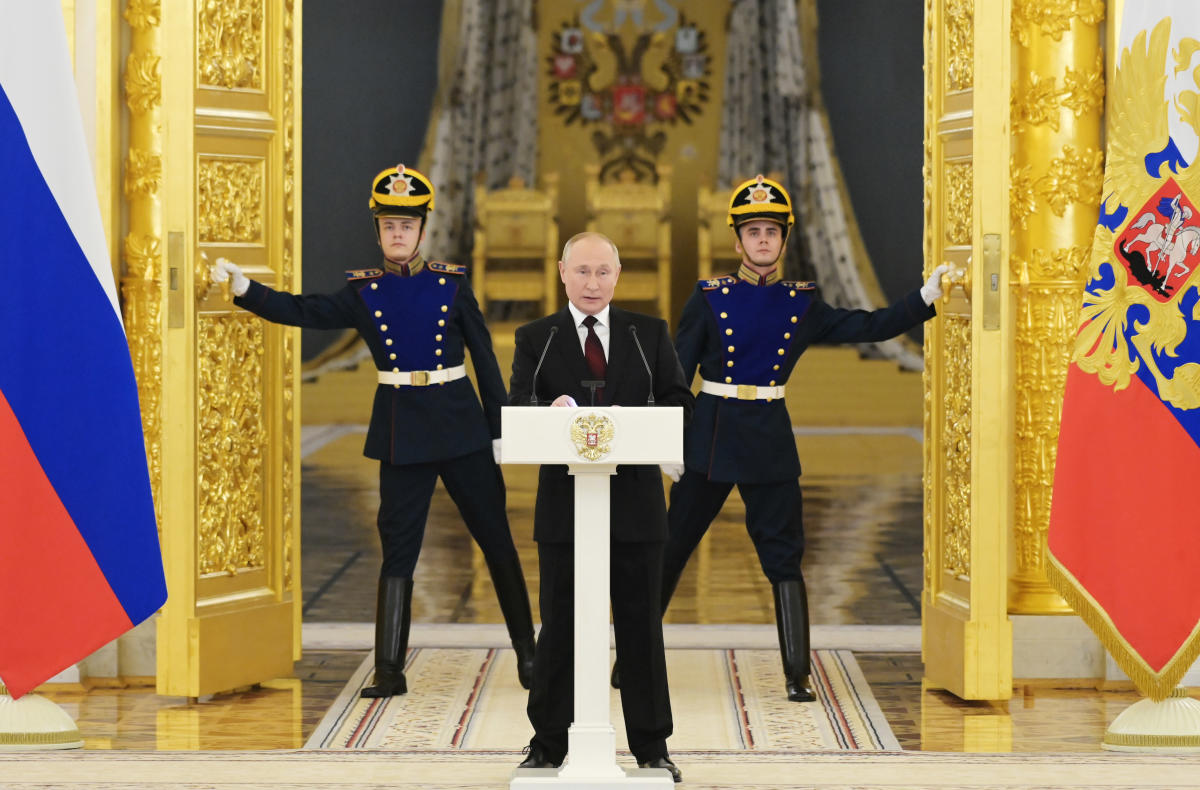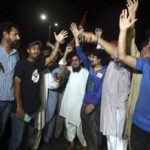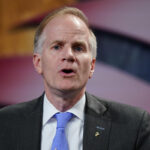
NEW YORK (AP) — With the Russian military in retreat from around Kyiv and facing condemnation for brutal tactics, harsh political repression at home and the economy buffeted by Western sanctions, adversaries and allies alike are raising the same question about President Vladimir Putin: Can he hold onto power?
The answer: For now, but maybe not forever.
After 22 years in power, Putin has built a powerful phalanx of loyalists who surround him, both in the Russian military and the secret services. He also has significant support among the Russian people, who are steeped in pro-Putin propaganda through the Russian leader’s almost total control of television and other mass communication. Even today, many Russians view his leadership as having delivered greater prestige, prosperity and stability for the country over two decades.
This edifice of protection, the vast wealth Putin controls and the lack of any significant history of palace coups in Russia make either of the obvious means of removing Putin — a military mutiny or a mass popular “color” revolution — almost inconceivable right now.
Yet all strongman states are inherently vulnerable to the unforeseen — especially when they become deaf to the society around them. Just ask Hosni Mubarak.
“For God’s sake, this man cannot remain in power,” declared President Joe Biden of Putin last month in Poland. It was an unscripted but heartfelt comment as the bloodletting in Ukraine has mounted.
The 69-year-old Putin is up for re-election in 2024, and changes in the Russian constitution conceivably would allow him to remain president until 2036. But the imprisonment of Russia’s best-known opposition figure, Alexei Navalny, is just one sign that Putin is not confident enough of his popularity to submit to an actual democratic test.
While there can be no credible polling in a country now effectively under martial law, the number of Russians informed and courageous enough to protest against the war in Ukraine so far has numbered in the thousands, not the hundreds of thousands.
Tens of thousands of affluent citizens, intellectuals and political critics have abandoned Russia rather than remain under the tight controls Putin has imposed, finding escape in Istanbul, Tbilisi or cities in the West. This brain drain no doubt will hurt Russia in the future. But at the moment, their departure removes a possible nexus of opposition from the society.
Of course, history is unpredictable. Few anticipated the rapid dissolution of the Soviet Union at the end of the 1980s and the beginning of the 1990s. If Russian casualties in Ukraine are as high as has been reported — 15,000 or more dead and three times that wounded in the space of six weeks — those results eventually will begin filtering through the society in spite of official censorship.
Arguably, the USSR’s fate was sealed in 1986 after its then-leader, Mikhail Gorbachev, loosened the Communist Party’s iron grip on information and set sights on the restructuring of the Soviet Union’s stagnating economy in order to better compete with the West. That was the year of the Chernobyl nuclear disaster, when the Politburo — after initially trying to cover up the disaster — was forced to disclose it to the Soviet public. The Soviet war in Afghanistan, meanwhile, had turned into a quagmire, leading to withdrawal in 1988-89.
In 1988, when Polish workers loyal to the independent Solidarity union movement launched a series of strikes in coal mines and shipyards, Gorbachev signaled that he would not intervene in one of the Soviet Union’s key satellite states. Then-Polish leader Gen. Wojciech Jaruzelski, whose 1981 imposition of martial law had led that country nowhere, opted instead to open up talks with the strikers’ leader, Lech Walesa. The result: partly democratic elections.
That in turn set in motion a series of dominoes within the Eastern European countries, with Hungary, Czechoslovakia, East Germany, Bulgaria, Romania and Albania all seeking to escape Soviet dominance and Communist rule. Before long, the fever had spread to the Baltic countries that were part of the Soviet Union itself, and nationalist emotions flared across the union.
Hardliners in Moscow who had seen enough attempted a coup against Gorbachev, but they were too late. That quickly was overturned by the popular outpouring of support led by Boris Yeltsin. On Dec. 31, 1991, both Gorbachev and the Soviet Union had been swept aside when the Soviet Union ended.
Putin, at the time an intelligence agent in East Germany, lived through the events and has drawn appropriate conclusions to maintain control now. Even before the war in Ukraine, he worked to shape public opinion by portraying the Ukrainians as Nazis who threatened Russia. Then, he clamped down on independent media organizations and the few remaining civil society groups.
More recently, he has imposed draconian anti-media laws that ban telling the Russia public anything about the war that conflicts with the Kremlin’s chosen narrative about the “special military operation.” Dissenters and doubters have been branded as scum and gnats, worthy only to be spat out.
Aside from Gorbachev, the sole Soviet leader to be removed was Nikita Khrushchev, whose 11 years in power ended in 1964.
He was forced out by his closest associates in the Communist Party. Disturbed by a series of disastrous economic decisions, a failed initiative to install nuclear weapons in Cuba and the signs that Khrushchev intended to build a cult of personality, fellow members of the Communist Presidium denounced him in a closed meeting while he was away.
When he returned, realizing that he had lost all support, Khrushchev agreed to step aside on fictional grounds of ill health. He soon was rendered a nonperson within the Soviet Union, as his successor Leonid Brezhnev assumed the leadership. But again, Khrushchev’s bloodless removal was unique.
Could something like that happen to Putin as economic conditions worsen, or if the Ukrainian invasion is a disaster for Russia?
Unlike the Soviet Union, there is little in the way of an institutional party structure that could intervene to topple him. Putin has cronies, yes men, and a coterie of “siloviki” — people of power awash in hard-nosed nationalist thinking of the FSB and military — none of whom so far dare to show the least independence from Putin’s Ukraine war “project.”
Yet losses on the battlefield have already led to an apparent paring-down of military goals, angering and disappointing some anti-Ukraine pundits on Russian TV.
While Putin’s coterie has every incentive to stay close for the time being or risk losing privileges and wealth, if the war in Ukraine drags on for months or years, and Putin’s adventure becomes the mammoth disaster that it appears to be so far, it is almost certain that cracks will emerge.
Absent Russia’s total victory over Ukraine, it already is difficult to imagine the world going back to business as usual with Vladimir Putin. He could find himself boxed into a grinding, open-ended conflict on his border and facing a need to impose more and more repression at home to stifle dissent in a population paying the economic consequences of the invasion.
Aging leaders rarely last forever or have the luxury to leave office on their own terms. Whether it is by elections, revolt or an internal mutiny, the long days of Putin’s rule may well be numbered.
___
John Daniszewski, former senior managing editor for international news at The Associated Press, first reported from Eastern Europe in 1987 and has been based in Warsaw, Johannesburg, Cairo, Moscow, Baghdad and London. He is currently AP’s vice president for standards and editor at large. Follow him on Twitter at http://twitter.com/jdaniszewski




